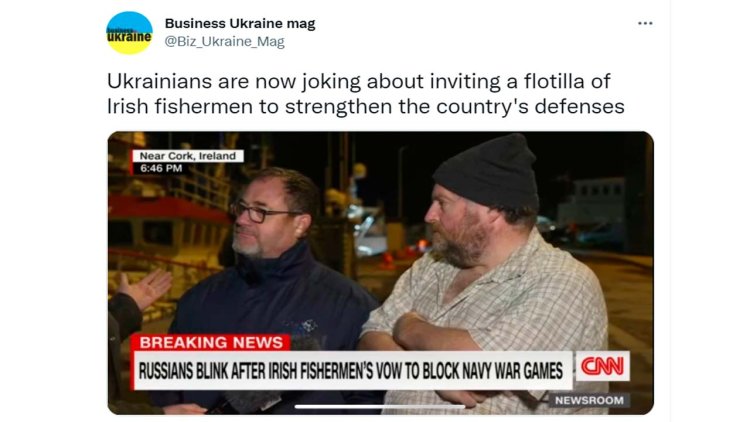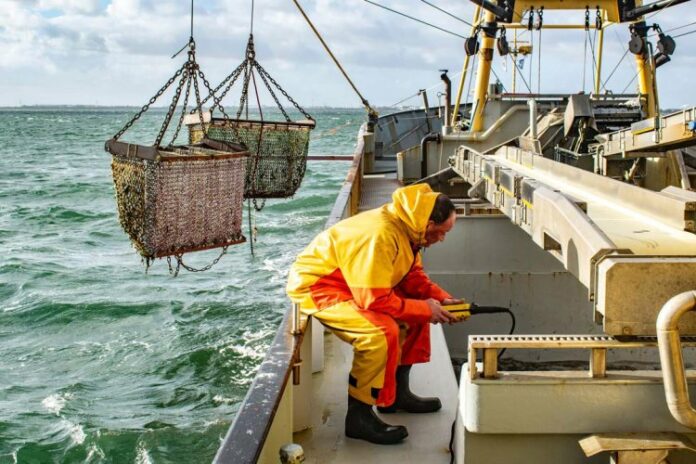Western powers’ diplomatic overtures to Russia, aimed at de-escalating tensions over Ukraine, have made little headway in recent weeks. Irish fishermen have seen more success.
Russia said it would relocate naval exercises scheduled to take place off Ireland’s southern coast beginning Feb. 3 following an outcry from local fishermen, who had pledged to protest the exercises and launched a diplomatic campaign to convince Russia to change course.
Yuri Filatov, the Russian ambassador to Ireland, said in a news release Saturday that Russia’s defense minister had decided, “as a gesture of goodwill,” to move the military exercises outside of Ireland’s exclusive economic zone “with the aim not to hinder fishing activities by the Irish vessels in the traditional fishing areas.”
Fishermen near Cork in southern Ireland cheered the announcement, and social media users circulated posts commending them for standing up to Russia.
The naval drills were slated to take place Feb. 3-8 about 150 miles off the coast of west Cork, within Ireland’s exclusive economic zone. Ireland retains control of all economic resources, including fishing, within the zone, which can extend to a maximum of 200 nautical miles from the shore.
International law permits the Russian military to carry out exercises in the area. But fishermen said the drills would threaten the fish stock and disrupt their traditional fishing grounds.
In what they described as a “peaceful protest,” the fishermen pledged to carry on with their fishing activities as usual, Russian warships or no Russian warships.
Filatov, the Russian ambassador, initially dismissed the controversy around the drills as “hugely overblown” and part of a “propaganda campaign” about an alleged Russian threat to Europe, according to the BBC.
Irish foreign minister Simon Coveney wrote to the Russian defense minister last week to ask Moscow to reconsider the naval exercises.
“I have made it clear to the Russian ambassador in Ireland that it’s not welcome. This is not a time to increase military activity and tension in the context of what is happening with and in Ukraine at the moment,” Coveney said last week, CNN reported.

The dispute came as tensions between Russia and Ukraine reach an apex. Russia has massed tens of thousands of troops on the border with Ukraine, and officials in Washington and London have warned a Russian military invasion is imminent.
Britain said Saturday it was preparing to send extra forces to Eastern Europe to shore up NATO allies, after President Biden said he would send some U.S. troops to the region for the same purpose. The U.S. military has issued “prepare to deploy” orders to 8,500 personnel, even as Russian and Ukrainian authorities accused Western officials of overhyping the likelihood of a Russian attack.
Ireland is not a member of NATO.
Brendan Byrne, chief executive of the Irish Fish Processors and Exporters Association, who also took part in talks with Russian embassy officials, told Sky News that his organization is now calling for a 10-year moratorium on naval exercises by any country within Ireland’s exclusive economic zone.
Brendan Byrne, chief executive of the Irish Fish Processors and Exporters Association, who also took part in talks with Russian embassy officials, told Sky News that his organization is now calling for a 10-year moratorium on naval exercises by any country within Ireland’s exclusive economic zone.
Russia “may have miscalculated” in selecting the area for its drills, he said.
“The Irish fishing industry wasn’t going to back down.”



